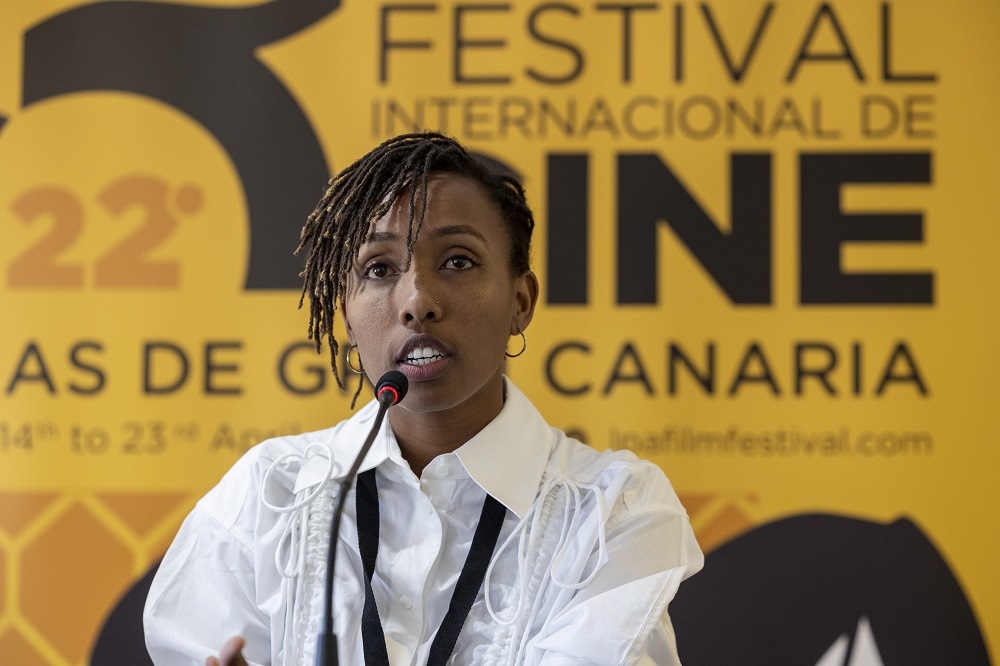➢ Myriam U. Birara’s first feature film, which received a Special Mention at the Berlinale, premieres in Spain as part of the Official Section of the Festival
➢ The director will talk with the audience today, April 21, after the screening of her film, programmed at 8:15 p.m. at Cinesa El Muelle Screen 9, where it will be shown again tomorrow, April 22, at 6 p.m.
➢ The catalog and full schedule are available on the official website lpafilmfestival.com

Las Palmas de Gran Canaria, Friday, April 21, 2023.- Far from the romantic character evoked by its title, The Bride (Rwanda, 2023, 73 min.) is the story of a collective drama many Rwandan women have suffered: forced marriage. A currently illegal cultural practice that has become a taboo subject and whose barriers Myriam U.Birara sought to break. Thus, in her first feature film, now competing in the Official Section of the Las Palmas de Gran Canaria International Film Festival, the director wanted to rescue from oblivion that not-so-distant practice.
The film has premiered in Spain as part of the capital’s film event after being recognized with a Special Mention at the last Berlinale. It tells the story of Eva, a young woman who hopes to become a pediatrician until she is kidnapped and raped by a stranger named Silas. Dragged into a marriage she does not want, the bond of friendship with her husband’s cousin will be her only support and contact with the historical past of her country.
Birara sets The Bride in rural Rwanda in 1997, an extremely traumatic time after the recent genocide that took place three years earlier against the Tutsi community. This historical event is present in the filmmaker’s debut feature, which focuses on its consequences, especially for women. In those years, guterura, the name given to bride kidnapping, became a widespread and painful practice for many girls.

“I felt I had to tell these stories because it seems that they have been forgotten, but the reality is that there are still many women who were victims of forced marriage and this has become a taboo subject even in their own families, since many have children and cannot tell them how their family was formed. That’s why I wanted to bring their stories to light and overcome the barriers of that taboo,” explained the director at a press conference.
The filmmaker has shared some insights into the creative process of her latest work, which, she revealed, came about while she was writing the script for another piece. “The truth is that it was a very easy and quick idea to write because it is a women’s story and I also identified with it,” she said. Myriam U. Birara gives, precisely, a prominent role in the plot to the friendship born between the main character and her husband’s cousin. A relationship that she wanted to make look “natural” on the big screen, where she wanted to reflect the contrast in the maturity of both characters.
She also wanted to show the abrupt change from childhood to adulthood, even as children, to which the victims of forced marriages were forced to go through. To do this, she sought a cast that could be physically identified with the youth of the protagonists of her story. The casting, she admitted, “was not easy.”. Despite this, she found in Sandra Umulisa and Aline Amike the right actresses. The former, younger sister of the director herself, offered to play the role of Eva. The latter was contacted after an intensive search on social networks.
The result of the work of the whole team is a completely independent film that was made thanks to their savings and family help, as it did not receive any state aid. Which did not prevented the film from being screened at the Berlin International Film Festival in February and or from competing now in the Las Palmas de Gran Canaria International Film Festival. According to the filmmaker, at the end of June The Bride will hit Rwandan movie theaters, where Birara is “eager to check” the audience’s reaction, as well as that of some political leaders who consider it “contrary to the country’s traditions.”
The Las Palmas de Gran Canaria International Film Festival, organized by the Culture area of the Gran-Canarian capital’s City Council through Promoción de la Ciudad de Las Palmas de Gran Canaria, has received public assistance by the ICAA [Institute of Cinematography and Audiovisual Arts] and the program for the internationalization of Spanish culture, PICE Visitantes, of Acción Cultural Española (AC/E).
Among the Festival’s collaborators we may find Cinesa El Muelle, El Muelle Shopping Center, Hotel Cristina by Tigotan, the Elder Museum of Science and Technology or Casa África, places which also function as venues or hold activities of the film event; as well as other institutions and companies such as Sagulpa, Hospitales San Roque, Audiovisuales Canarias, Music Library & SFX or the International Bach Festival. Likewise, its market, MECAS, has been possible thanks to the sponsorship of the Gran Canaria Film Commission-Sociedad de Promoción Económica de Gran Canaria and the support of Canary Islands Film and Proexca.
The University of Las Palmas de Gran Canaria, the Mid Atlantic University, the the CIFP Felo Monzón Grau-Bassas, the Canary Islands Film Institute, the Audiovisual Cluster of the Canary Islands, Digital 104, CIMA [Association of Women Filmmakers and Audiovisual Media], the Asociación Microclima Cineastas de Canarias [Association of Filmmakers of the Canary Islands ‘Microclima’] and Tusity are also collaborators of the Festival.
Share this Post

